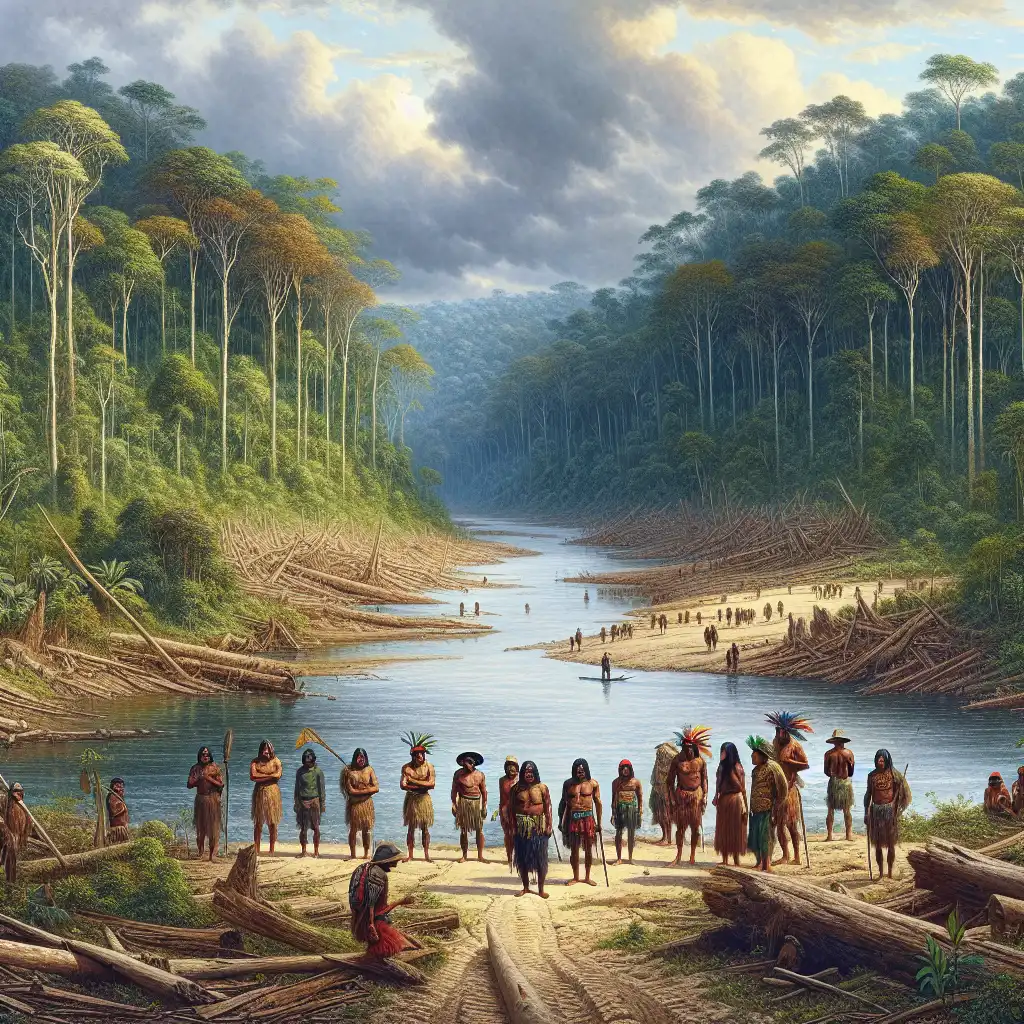Table of Contents
ToggleIntroduction
In a significant development, rare images of the Mashco Piro, an uncontacted indigenous tribe residing in the remote Peruvian Amazon, have been published by Survival International. These pictures reveal dozens of tribe members on the banks of a river, near areas where logging companies have established concessions. This disclosure has sparked both intrigue and concern as the tribe’s sightings have become more frequent in recent weeks, potentially due to the encroaching presence of loggers.
The indigenous rights group FENAMAD has reported that the Mashco Piro are increasingly venturing out of the rainforest in search of food. Their movement away from their traditional habitats, driven by the activities of logging companies, sheds light on the pressing issue of deforestation and its impact on indigenous communities. This article delves into the recent sightings of the Mashco Piro, the challenges they face, and the broader implications of these encounters.
Recent Sightings of the Mashco Piro
Frequency and Location of Sightings
The Mashco Piro, an elusive tribe, were recently photographed at the end of June on the banks of a river in the Madre de Dios region in Southeast Peru, close to the Brazilian border. Survival International, an organization dedicated to protecting indigenous rights, released these photographs, highlighting the tribe’s precarious situation.
- Monte Salvado and Puerto Nuevo: More than 50 Mashco Piro individuals were seen near the Yine village of Monte Salvado, and another group of 17 appeared near Puerto Nuevo.
- Las Piedras River: On June 28, the Peruvian government confirmed sightings of the Mashco Piro on the Las Piedras river, approximately 150 kilometers from Puerto Maldonado, the capital of Madre de Dios.
Impact of Logging Activities
The increasing frequency of sightings is attributed to the tribe’s efforts to escape the growing presence of logging companies in their territory. According to FENAMAD, the Mashco Piro are moving away from their traditional forest homes due to the encroachment of logging operations.
- Deforestation and Habitat Disruption: Logging companies have been granted timber concessions within the Mashco Piro’s territory. These activities disrupt the natural habitat, forcing the tribe to seek food and safety elsewhere.
- Road Construction: One company, Canales Tahuamanu, has constructed over 200 kilometers of roads for timber extraction, further encroaching on the tribe’s land.
Challenges Faced by the Mashco Piro
Isolation and Vulnerability
The Mashco Piro have traditionally lived in isolation, rarely making contact with other communities or outsiders. This isolation has made them particularly vulnerable to external pressures and disruptions.
- Lack of Communication: The tribe does not communicate much with neighboring communities, including the Yine people. This lack of interaction adds to their vulnerability, as they have limited means to seek help or negotiate their needs.
- Health Risks: Contact with outsiders, including loggers and tourists, poses significant health risks to the tribe, who may have little immunity to common diseases.
Environmental and Social Pressures
The Mashco Piro are caught between the need to preserve their traditional way of life and the pressures exerted by modern development activities.
- Resource Scarcity: The encroachment of logging activities has led to a scarcity of natural resources, compelling the tribe to venture out of their secure zones in search of food and other necessities.
- Cultural Erosion: Continued contact with external entities could lead to the erosion of the tribe’s cultural practices and knowledge, which have been preserved through generations of isolation.
Broader Implications
Indigenous Rights and Conservation
The plight of the Mashco Piro highlights the broader issues of indigenous rights and environmental conservation.
- Legal Protections: There is a need for stronger legal protections to safeguard the territories and rights of uncontacted tribes. This includes stricter regulations on logging concessions and enforcement of no-contact policies.
- Conservation Efforts: Protecting the natural habitats of indigenous tribes is crucial for both biodiversity conservation and the preservation of unique cultural heritages.
Global Awareness and Responsibility
The international community has a role to play in addressing the challenges faced by uncontacted tribes like the Mashco Piro.
- Raising Awareness: Organizations like Survival International are crucial in raising global awareness about the threats to uncontacted tribes. Public support and advocacy can drive policy changes and conservation efforts.
- Ethical Engagement: It is essential to engage with indigenous communities ethically, respecting their autonomy and right to self-determination.
FAQs
What is the current status of the Mashco Piro tribe?
The Mashco Piro tribe remains largely uncontacted and isolated, although recent sightings indicate they are moving closer to areas affected by logging activities. They are currently facing significant challenges due to habitat disruption and resource scarcity.
Why are the Mashco Piro leaving their traditional forest homes?
The Mashco Piro are leaving their traditional forest homes primarily due to the encroachment of logging activities, which are disrupting their natural habitat and depleting their food sources.
What are the health risks associated with contact between the Mashco Piro and outsiders?
Contact with outsiders poses serious health risks to the Mashco Piro, who may have little immunity to common diseases. This can lead to outbreaks of illnesses that could devastate the tribe.
How can the international community help protect the Mashco Piro?
The international community can help protect the Mashco Piro by supporting organizations that advocate for indigenous rights, raising awareness about their plight, and pushing for stronger legal protections and conservation efforts.
Conclusion
The recent sightings of the Mashco Piro bring to light the urgent need for action to protect uncontacted tribes and their habitats. The encroachment of logging activities poses significant threats to their way of life, forcing them to leave their traditional homes in search of food and safety. Ensuring the rights and well-being of the Mashco Piro requires a concerted effort from local authorities, international organizations, and the global community. By raising awareness and advocating for stronger protections, we can help safeguard the future of this unique and vulnerable tribe.












